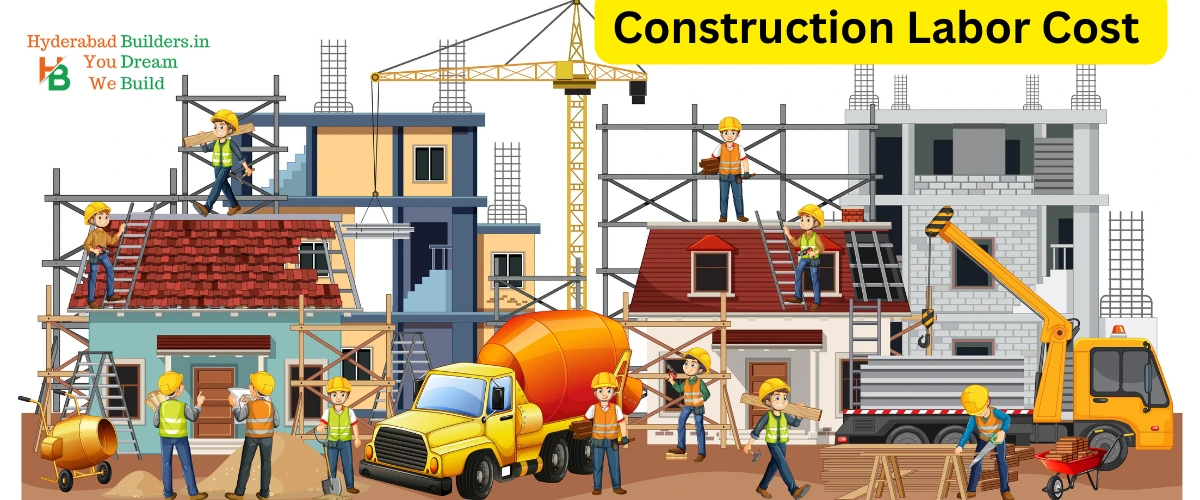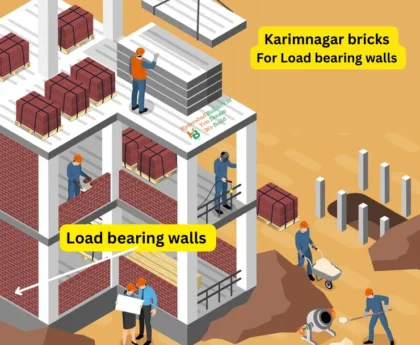Construction labor cost in India
Table of Contents
Toggle- Construction labor cost in India
- What is Labor cost in Construction:
- Labor Rate If you hire a contractor
- 2024 Construction Labor cost price list(civil works) in India
- Labor Rate for Finishing Works:
- Types of House construction labor cost
- Labor cost by square foot
- 1. Deep Dive into Construction Labor Cost in India:
- Types of Construction Labor Costs:
- How to Manage Labour cost
- Step-by-Step Guide to Calculating Labor rates:
- How to control Labor Cost in Construction Projects:
- Efficient Construction Labor Cost Management from Hyderabad Builders
Introduction: Constructing a building, whether it’s a residential home or a commercial structure, involves several key elements, and one of the most significant components is construction labor cost. Labor costs play a crucial role in determining the overall expense of a construction project and are influenced by various factors. In India, a country with diverse construction practices and a booming real estate industry, comprehending construction labor costs is essential for effective project planning and budgeting
What is Labor cost in Construction:
Labor cost in construction refers to the total financial expenditure associated with employing and compensating the workforce engaged in building or renovating a structure. This includes wages, benefits, taxes, training, and any additional expenses related to the employment of construction workers. Labor cost is a key component of the overall budget for construction projects, impacting the financial planning and feasibility of such endeavors.
Labor Rate If you hire a contractor
When hiring a labor contractor for house construction, the house construction labor rate typically ranges from ₹250 to ₹350 per square foot in India . Before engaging a contractor, it’s crucial to draft a comprehensive agreement outlining various aspects of the project. This agreement should specify the scope of work, payment structure, material responsibilities, project timeline, permits, insurance requirements, change orders procedure, termination conditions, and a dispute resolution mechanism. Signatures from both the house owner and the labor contractor confirm mutual understanding and commitment to the agreed terms.
2024 Construction Labor cost price list(civil works) in India
- Total labor rate for House construction
- Total building construction labour rate per square feet is Rs. 250 to Rs. 350 per sqft (Materials excluded )
- labor rate for Brickwork & Blockwork(with out material):
- 4 inch brick/block work: Rs. 18 to Rs. 20 per sqft
- 6 inch brick/block work: Rs. 24 to Rs. 26 per sqft
- 8 inch brick/block work: Rs. 28 to Rs. 35 per sqft
- Soil Filling:
- labour cost for murum(soil) filling Rs. 4 to Rs. 5 per Cft or Rs. 140 to Rs. 175 per Cum
- PCC Placing:
- Rs. 30 to Rs. 40 per sqft or Rs. 325 to Rs. 450 per Cum (including labor + materials)
- labor rate for Concrete Work:
- Footing Concrete: Rs. 40 to Rs. 45 per Cft or Rs. 1400 to Rs. 1450 per Cum
- Column Concrete: Depends on wall thickness & site location
- Plinth Beam Concrete: Rs. 50 to Rs. 60 per Cft or Rs. 1750 to Rs. 2100 per Cum
- Roof/Slab Concrete: Rs. 50 to Rs. 60 per Cft or Rs. 1750 to Rs. 2100 per Cum
- Reinforcement Bar Bending:
- labor rate for Reinforcement Bar Bending work is Rs. 4 to Rs. 7 per kg or Rs. 4000 to Rs. 7000 per Mt
- Slope Roof Concrete:
- Rs. 70 to Rs. 75 per Cft or Rs. 2500 to Rs. 2650 per Cum
- Cantilever & Elevated Slab: Rs. 60 to Rs. 65 per Cft or Rs. 2100 to Rs. 2300 per Cum
- Labor rate for Wall Plastering:
- 15 to Rs. 25 per sqft (Depends on thickness, types & finishing)
- 20mm thick external plastering: Rs. 23 to Rs. 25 per sqft
- 12mm thick internal plastering: Rs. 18 to Rs. 22 per sqft
- 6mm thick Ceiling/Concrete plastering: Rs. 15 to Rs. 18 per sqft
- Excavation:
- Labor rate for excavation work is Rs. 7 to Rs. 10 per sqft or Rs. 250 to Rs. 350 per Cum
- Sump Tank Construction:
- Rs. 10 to Rs. 12 per sqft
- Shuttering Works:
- Rs. 35 to Rs. 40 per sqft (Footing, beam, column, slab, staircase, etc.)
- Shuttering Board Making:
- Rs. 35 to Rs. 40 per sqft
- Scaffolding & Staging:
- Rs. 10 to Rs. 12 per sqft
- Overhead Water Tank Construction:
- Rs. 3 to Rs. 5 per Ltr (Labor rates vary based on tank sizes)
- Parapet Wall:
- Rs. 45 to Rs. 50 per sqft (Brickwork + Plastering Complete)
- Brick Masonry: Rs. 3 to Rs. 5 per Ltr
- RCC: Rs. 35 to Rs. 40 per Ltr
- Centering Rate
- Cost of Centering is around RS 4500 to 6000 per Metric Ton including material and labour.
Labor Rate for Finishing Works:
- Electrical Works:
- Rs. 8 to Rs. 15 per sqft
- a) Slab Pipes Installation: Rs. 2 to Rs. 3 per running foot (Rft)
- b) Wall cutting & Pipe fitting: Rs. 8 to Rs. 10 per Rft
- Finishing Works:
- a) Water Proofing Works: Rs. 20 to Rs. 25 per sqft
- b) Tiles/Marble Laying: Rs. 15 to Rs. 20 per sqft
- Wall Putty + Primer + Paint Works: Rs. 8 to Rs. 12 per sqft
- 3 to 4” plastering groove: Rs. 6 to Rs. 10 per sqft
- Ventilator Fixing: Rs. 250 to Rs. 300 per piece
- Door frame & fabrication works: Rs. 8 to Rs. 10 per sqft
- Water & Plumbing works: Rs. 10 to Rs. 15 per sqft
- Flooring PCC: Rs. 15 to Rs. 25 per sqft
- Repairs & Maintenance:
- Rs. 2 to Rs. 5 per sqft
- Sanitary Works:
- For Only Wall Putty: Rs. 3 to Rs. 4 per sqft
- MCB Installation:
- Rs. 150 to Rs. 160 per MCB
- Socket + Switch Installation:
- Rs. 300 per piece
- Switch Installation:
- Rs. 150 per piece
Note: Labor rates can vary based on location, project complexity, and specific requirements. It’s advisable to get detailed quotes from contractors to ensure accurate budgeting for electrical and finishing works
Types of House construction labor cost
Class A construction cost:
- Labor Cost Without Material: ₹400- ₹600
- For a 1000 sqft house: ₹400,000 – ₹600,000
- For a 2000 sqft (two-floor) house: ₹800,000 – ₹1,200,000
Class B Construction cost:
- standard Construction Labor Cost Without Material: ₹250 – ₹350
- For a 1000 sqft house: ₹250,000 – ₹350,000
- For a 2000 sqft (two-floor) house: ₹500,000 – ₹600,000
Class C construction cost:
- Labor Cost Without Material: ₹150,000 – ₹180,000
- For a 1000 sqft house: ₹150,000 – ₹180,000
- For a 2000 sqft (two-floor) house: ₹300,000 – ₹360,000
Labor cost by square foot
| Square Footage | Construction Cost Range (INR) |
|---|---|
| 500 sq. ft. | 1,35,000 – 1,75,000 |
| 600 sq. ft. | 1,62,000 – 2,10,000 |
| 800 sq. ft. | 2,16,000 – 2,80,000 |
| 1000 sq. ft. | 2,70,000 – 3,50,000 |
| 1200 sq. ft. | 3,24,000 – 4,20,000 |
| 1500 sq. ft. | 4,05,000 – 5,25,000 |
| 1800 sq. ft. | 4,86,000 – 6,30,000 |
1. Deep Dive into Construction Labor Cost in India:
Understanding the multifaceted nature of construction labor costs in India is crucial for any project’s financial planning and execution. These costs extend far beyond the basic wages paid to on-site workers, encompassing a range of factors that collectively impact the overall budget.
Diverse Workforce
- Skilled Laborers: This category includes tradespeople such as masons, electricians, plumbers, carpenters, and steelworkers. Their wages are typically higher due to the specialized skills and training required, contributing to the overall construction labor cost.
- Unskilled Laborers: Often forming the bulk of the workforce, these laborers perform general tasks and are essential for the day-to-day operations on a construction site. Their wages are generally lower but can vary based on demand and availability.
- Project Managers and Supervisory Staff: These roles are critical for overseeing the project’s progress, ensuring quality, and meeting deadlines. Their compensation includes salaries and potentially performance-based incentives.
- Back-Office Support: This includes administrative staff, HR personnel, accountants, and procurement officers. Their salaries are part of the indirect labor costs and are essential for the smooth running of the project.
Geographical Variance
- Urban vs. Rural Areas: Construction Labor costs in urban areas like Mumbai, Delhi, and Bengaluru are typically higher due to the higher cost of living and greater demand for skilled labor. In contrast, rural areas have lower labor costs but may face challenges in availability and skill level.
- Regional Differences: Labor costs can also vary between different states and regions in India due to varying economic conditions, availability of labor, and regional regulations.
Project-Specific Variations
- Residential vs. Commercial Projects: Residential projects often have different labor requirements compared to commercial projects, which might require more specialized skills or involve larger teams.
- Infrastructure Projects: Large-scale infrastructure projects such as highways, bridges, or metro rail constructions demand a diverse range of labor expertise, often requiring specialized and highly skilled workers.
- Project Duration and Complexity: Longer and more complex projects may require a sustained workforce for extended periods, impacting labor costs. Similarly, projects with specific technical requirements may necessitate hiring specialists at higher wage rates.
Types of Construction Labor Costs:
A comprehensive understanding of the various labor cost types is essential for accurate budgeting and effective cost control in construction projects. Each type of labor cost plays a unique role in the overall financial management of a project.
Direct Labor Costs
- Wages: The most apparent cost, it includes the daily or hourly wages paid to on-site workers.
- Benefits and Allowances: This may include health insurance, provident fund contributions, bonuses, and other employee benefits. These are integral to the total labor cost and can vary based on company policies and labor laws.
Indirect Labor Costs
- Support Staff Salaries: These are the costs associated with employees who contribute to the project indirectly, such as administrative staff, HR, and accounting personnel.
- Project Support and Administration: Costs involved in managing the project, including site supervisors, safety officers, and quality control inspectors. While not directly involved in construction activities, their role is vital for project execution.
Overtime Costs
- Extended Work Hours: Common in projects with tight deadlines, overtime costs arise when workers are required to work beyond their regular working hours.
- Management Strategies: Requires careful planning to manage, as excessive overtime can lead to increased costs and potentially decreased worker productivity and morale.
Training Costs
- Skill Development: In an industry evolving with new technologies and methods, investment in training is crucial for upgrading workers’ skills.
- Safety Training: Specialized training for safety practices is essential, especially in high-risk construction environments.
Travel Costs
- Remote Projects: Involves expenses for transporting workers to and from remote or distant job sites.
- Specialist Workers: When projects require specialist workers from other regions or states, their travel, lodging, and daily allowances become part of the project’s labor costs.
Subcontractor Costs
- Specialized Tasks: Includes costs for subcontractors hired for specific tasks like electrical installations, plumbing, or HVAC systems.
- Contract Management: Ensuring that subcontractor costs are aligned with the project budget and their work meets the required standards.
Union Costs
- Collective Bargaining Agreements: In regions with strong labor unions, costs can include union dues, wages set by union contracts, and other stipulated benefits.
- Negotiations: Managing these costs may involve negotiations with unions to align with project budgets while adhering to labor laws.
How to Manage Labour cost
- Effective construction labor cost management is a cornerstone of successful construction project management. Its significance can be broadly categorized into several key areas:
1. Budget Management
- Major Expense Item: Labor costs often account for a substantial portion of the total construction budget. Mismanagement here can lead to significant financial overruns.
- Profitability: Keeping labor costs under control is essential for maintaining the profitability of the project. It ensures that the project stays within the financial constraints set by the client or the company.
2. Timely Project Completion
- Avoiding Delays: Inefficient management of labor, such as underestimating the time or manpower required for tasks, can lead to delays. This can have a cascading effect on the project timeline.
- Workforce Management: Proper scheduling and allocation of labor are crucial to avoid bottlenecks. Overstaffing or understaffing at various project stages can impact efficiency and timelines.
3. Resource Optimization
- Balancing Act: Efficient construction labor cost management ensures optimal use of available human resources, avoiding situations where workers are either overburdened or underutilized.
- Material and Financial Resource Allocation: Savings on labor costs can free up budget space for better quality materials or other critical aspects of the project, enhancing overall quality and value.
4. Compliance and Efficiency
- Legal Adherence: Compliance with labor laws, including minimum wage standards, overtime pay, and working conditions, is essential. Non-compliance can lead to legal issues and damage the company’s reputation.
- Maximizing Productivity: Effective labor cost management involves optimizing workforce productivity. This means ensuring workers are well-trained, adequately rested, and efficiently deployed.
Additional Considerations
- Morale and Safety: Fair and transparent labor management practices contribute to better morale among workers, which in turn can enhance safety and work quality.
- Long-Term Sustainability: In the broader context, efficient construction labor cost management contributes to the sustainability of the construction business by ensuring projects remain viable and profitable
Step-by-Step Guide to Calculating Labor rates:
Accurately calculating labor costs is crucial for any construction project’s budgeting and planning. Here’s a detailed guide to navigate through this process:
1. Detailed Task Breakdown
- Identify Every Task: List out all tasks required for the completion of the project, from groundwork to finishing touches.
- Detailing: Break down larger tasks into smaller, manageable components. For instance, instead of a single item like “build wall”, break it down into sub-tasks like laying the foundation, erecting the structure, plastering, and painting.
2. Time Estimation
- Analyze Duration: Estimate the time required to complete each task. This should be based on the nature of the task and historical data from past projects.
- Consider Variables: Take into account factors like the skill level of workers required (skilled vs. unskilled labor), the complexity of the task, and site conditions that may affect work speed.
3. Wage Rate Assessment
- Determine Wage Rates: Establish the wage rates for different types of labor. These rates can vary based on the skill level, experience, and regional labor market conditions.
- Include Additional Costs: Remember to factor in additional costs like employee benefits, insurance, and any other overheads that are part of the compensation package.
4. Cost Multiplication
- Calculate Task Costs: For each task, multiply the estimated time by the wage rate to get the labor cost. For example, if a task requires 10 hours of skilled labor at a rate of ₹500 per hour, the labor cost for that task would be ₹5,000.
- Accommodate for Overheads: If overheads are not included in the wage rate, add a percentage to cover these costs.
5. Total Cost Aggregation
- Sum of Individual Costs: Add up the labor costs of all tasks to get the total labor cost for the project.
- Contingency Allowance: It’s prudent to include a contingency allowance to cover unforeseen labor costs or variances in estimates.
Additional Tips:
- Use Project Management Software: Tools like MS Project or specific construction management software can help automate and track these calculations.
- Regular Review and Adjustments: Periodically review the labor costs against actual expenses to ensure the project stays on budget.
- Historical Data Reference: Use data from previous similar projects as a benchmark for more accurate estimations.
How to control Labor Cost in Construction Projects:
Effective labor cost management is vital for the success of construction projects. Implementing strategic measures can significantly improve efficiency and cost-effectiveness. Here are key strategies:
1. Robust Planning and Scheduling
- Minimize Downtime: Efficient scheduling ensures that labor is used productively, with minimal idle time.
- Optimize Labor Utilization: Allocate the right number of workers for each task based on its requirements, avoiding both shortages and excesses.
2. Material and Method Efficiency
- Labor-Efficient Materials: Choose materials that are easier and quicker to install, which can reduce the labor hours required.
- Innovative Construction Methods: Adopt modern construction methods that can speed up the building process and require less labor.
3. Technology Adoption
- Project Management Software: Tools like BIM can streamline project management, making it easier to track progress and manage labor.
- Digital Labor Tracking: Implement digital tools for accurate tracking of labor hours, which helps in monitoring productivity and managing payroll.
4. Regular Cost Monitoring
- Budget Tracking: Regularly compare actual labor costs against the budget to identify and rectify any variances.
- Cost Reporting: Maintain detailed and regular reports on labor spending to make informed decisions.
5. Flexible Labor Options
- Contract and Part-Time Workers: For tasks that don’t require full-time commitment, consider hiring contract or part-time workers.
- Temporary Labor: Utilize temporary labor for peak periods to handle increased workload without committing to long-term employment, providing a cost-effective approach to managing construction labor costs
6. Comprehensive Project Plans
- Detailed Labor Cost Analysis: Include a thorough analysis of labor costs in the project plan for more accurate budgeting.
- Proactive Management: Anticipate potential labor cost issues and plan strategies to address them in advance.
7. Performance Tracking
- Assess Productivity: Regularly evaluate the productivity of the workforce and identify areas for improvement.
- Efficiency Improvements: Implement training or changes in work methods to improve labor efficiency.
Efficient Construction Labor Cost Management from Hyderabad Builders
Hyderabad Builders offers a range of features designed to enhance labor cost management in the construction sector:
Construction Estimating Tools
- Region-Specific Estimates: Provides tools for making accurate labor cost estimates that are tailored to specific regions or types of construction projects.
Labor Calculator
- Simplifies Calculations: Eases the process of calculating labor costs for various tasks, making budgeting more efficient.
Integration with Accounting Software
- Financial Tracking: Seamless integration with accounting software allows for better tracking of labor costs and overall project finances.
Time Tracking Functionality
- Accurate Labor Logging: Ensures that labor hours are logged accurately, helping to avoid discrepancies and ensuring that workers are paid correctly.
5. Strategies for Labor Cost Control: Implementing these strategies can lead to more effective labor cost management:
- Robust Planning and Scheduling: Minimizing downtime and optimizing labor utilization through effective scheduling.
- Material and Method Efficiency: Choosing labor-efficient materials and construction methods to reduce labor hours.
- Technology Adoption: Utilizing software and digital tools for streamlined project management and labor tracking.
- Regular Cost Monitoring: Keeping a constant check on labor spending against the budget.
- Flexible Labor Options: Considering contract, part-time, or temporary labor for non-core tasks.
- Comprehensive Project Plans: Including detailed labor cost analysis in project planning for better foresight and control.
- Performance Tracking: Regularly assessing labor productivity and making adjustments for efficiency.
6. Embracing builders in Hyderabad for Labor Cost Management: Hyderabad Builders offers a suite of features tailored for the Indian construction market:
- Construction Estimating Tools: For accurate and region-specific labor cost estimations.
- Labor Calculator: Simplifying the process of calculating labor costs for various tasks.
- Integration with Accounting Software: Facilitating seamless financial tracking and budget management.
- Time Tracking Functionality: Ensuring accurate logging of labor hours to avoid discrepancies.
Conclusion: In the competitive and fast-paced world of India’s construction industry, mastering labor cost management is a critical determinant of project success. This guide provides a comprehensive overview of the components of labor costs and strategic insights into managing them efficiently. With the adoption of advanced tools like construction companies in India can achieve greater control over their labor costs, leading to more successful and profitable projects.
The labor rates range from Rs. 250 to Rs. 350 per sqft, this is for total house construction excluding materials.
Labor rates for brickwork and blockwork, excluding material costs, vary based on the thickness of bricks or blocks. Currently, rates range from Rs. 18 to Rs. 20 per sqft for 4-inch work, Rs. 24 to Rs. 26 per sqft for 6-inch work, and Rs. 28 to Rs. 35 per sqft for 8-inch work.
Soil filling costs Rs. 4 to Rs. 5 per Cft or Rs. 140 to Rs. 175 per Cum
Labor rates for concrete work range from Rs. 40 to Rs. 65 per Cft or Rs. 1400 to Rs. 2300 per Cum, depending on the task
The labor rate for reinforcement bar bending is Rs. 4 to Rs. 7 per kg or Rs. 4000 to Rs. 7000 per Mt.
Labor rate range
| Type of Plastering | Thickness | Labor Rate Range (Rs. per sqft) |
|---|---|---|
| External Plastering | 20mm thick | Rs. 23 to Rs. 25 |
| Internal Plastering | 12mm thick | Rs. 18 to Rs. 22 |
| Ceiling or Concrete Plastering | 6mm thick | Rs. 15 to Rs. 18 |
Excavation costs Rs. 7 to Rs. 10 per sqft or Rs. 250 to Rs. 350 per Cum.
Sump tank construction is Rs. 10 to Rs. 12 per sqft.
Electrical labor work cost Rs. 8 to Rs. 15 per sqft, while plumbing works range from Rs. 10 to Rs. 15 per sqft.
MCB installation is Rs. 150 to Rs. 160 each, and socket/switch installation is Rs. 300 per piece
Wall putty, primer, and paint works cost Rs. 3 to Rs. 12 per sqft.
No, labor rates differ – Class A has a higher rate (₹400-₹600 per sqft) compared to Class B (₹250-₹350 per sqft) and Class C (₹150,000-₹180,000 for a 1000 sqft house
Yes, negotiating is common practice labor rates is common. Discuss with contractors, considering the scope of work, project details, and market rates.
Labor rates can vary, and it’s recommended to obtain detailed quotes from contractors. Including a contingency in your budget is advisable for unforeseen expenses.
The labor cost for 1 square foot of construction work varies from Rs. 250 to Rs. 350
Yes, you can simply WhatsApp about this pdf. we will provide you
the total labor cost for 1000 sq ft house is around ₹250,000- ₹300,000





